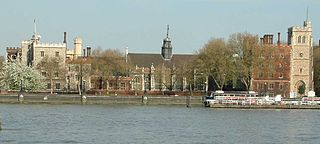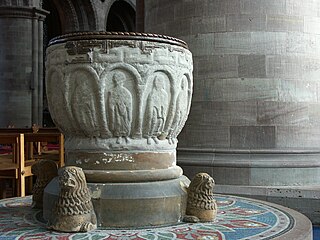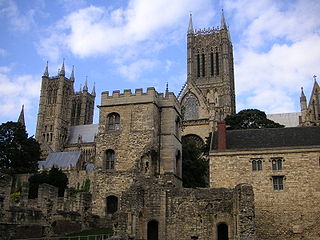
Boniface of Savoy was a medieval Bishop of Belley in Savoy and Archbishop of Canterbury in England. He was the son of Thomas, Count of Savoy and owed his initial ecclesiastical posts to his father. Other members of his family were also clergymen, and a brother succeeded his father as count. One niece Eleanor of Provence was married to King Henry III of England, and another was married to King Louis IX of France. It was Henry who secured Boniface's election as Archbishop, and throughout his tenure of that office, he spent much time on the continent. He clashed with his bishops, with his nephew-by-marriage, and with the papacy but managed to eliminate the archiepiscopal debt that he had inherited on taking office. During Simon de Montfort's struggle with King Henry, Boniface initially helped Montfort's cause but later supported the king. After his death in Savoy, his tomb became the object of a cult, and he was eventually beatified in 1839.

Robert Grosseteste, also known as Robert Greathead or Robert of Lincoln, was an English statesman, scholastic philosopher, theologian, scientist and Bishop of Lincoln. He was born of humble parents in Suffolk, but the associations with the village of Stradbroke is a post-medieval tradition. Upon his death, he was revered as a saint in England, but attempts to procure a formal canonisation failed. A. C. Crombie called him "the real founder of the tradition of scientific thought in medieval Oxford, and in some ways, of the modern English intellectual tradition". As a theologian, however, he contributed to increasing hostility to Jews and Judaism, and spread the accusation that Jews had purposefully suppressed prophetic knowledge of the coming of Christ, through his translation of the Testaments of the Twelve Patriarchs.

Godfrey Giffard was Chancellor of the Exchequer of England, Lord Chancellor of England and Bishop of Worcester.

Roger Northburgh was a cleric, administrator and politician who was Bishop of Coventry and Lichfield from 1321 until his death. His was a stormy career as he was inevitably involved in many of the conflicts of his time: military, dynastic and ecclesiastical.

Antony Bek was a bishop of Durham and the Patriarch of Jerusalem.
Jocelin of Wells was a medieval Bishop of Bath. He was the brother of Hugh de Wells, who became Bishop of Lincoln. Jocelin became a canon of Wells Cathedral before 1200, and was elected bishop in 1206. During King John of England's dispute with Pope Innocent III, Jocelin at first remained with the king, but after the excommunication of John in late 1209, Jocelin went into exile. He returned to England in 1213, and was mentioned in Magna Carta in 1215.

Alexander of Lincoln was a medieval English Bishop of Lincoln, a member of an important administrative and ecclesiastical family. He was the nephew of Roger of Salisbury, a Bishop of Salisbury and Chancellor of England under King Henry I, and he was also related to Nigel, Bishop of Ely. Educated at Laon, Alexander served in his uncle's diocese as an archdeacon in the early 1120s. Unlike his relatives, he held no office in the government before his appointment as Bishop of Lincoln in 1123. Alexander became a frequent visitor to King Henry's court after his appointment to the episcopate, often witnessing royal documents, and he served as a royal justice in Lincolnshire.
Nicholas Farnham was a medieval Bishop of Durham.
Robert Passelewe was a medieval Bishop of Chichester elect as well as being a royal clerk and Archdeacon of Lewes.
Roger Weseham was an English medieval Bishop of Coventry and Lichfield.

Robert Foliot was a medieval Bishop of Hereford in England. He was a relative of a number of English ecclesiastics, including Gilbert Foliot, one of his predecessors at Hereford. After serving Alexander, Bishop of Lincoln as a clerk, he became a clerk of Henry of Blois, the Bishop of Winchester and brother of King Stephen of England. He attended the Council of Reims in 1148, where another relative, Robert de Chesney, was elected as Bishop of Hereford. Chesney then secured the office of Archdeacon of Oxford for Foliot.
Robert de Chesney was a medieval English Bishop of Lincoln. He was the brother of an important royal official, William de Chesney, and the uncle of Gilbert Foliot, successively Bishop of Hereford and Bishop of London. Educated at Oxford or Paris, Chesney was Archdeacon of Leicester before his election as bishop in December 1148.

Hugh of Wells was a medieval Bishop of Lincoln. He began his career in the diocese of Bath, where he served two successive bishops, before joining royal service under King John of England. He served in the royal administration until 1209, when he was elected to the see, or bishopric, of Lincoln. When John was excommunicated by Pope Innocent III in November 1209, Hugh went into exile in France, where he remained until 1213.
William Ayermin was a medieval Bishop of Norwich.

Albin was a 13th-century prelate of the Kingdom of Scotland. A university graduate, Albin is known for his ecclesiastical career in the diocese of Brechin, centred on Angus in east-central Scotland.
Richard de Morins, also known as Richard of Mores, Richard de Mores, Ricardus de Mores, and Ricardus Anglicus was an English Augustinian canon of Merton Priory, before becoming prior at Dunstable Priory in 1202.
Robert of Lexinton was a British judge and administrator.
George Gresley Perry (1820–1897) was an English churchman and academic, known as a church historian and Archdeacon of Stow.
Robert de Mariscis(Robert Marsh) was a Priest in the Roman Catholic Church.
John Crakehall was an English clergyman and Treasurer of England from 1258 to 1260. Possibly the younger son of a minor noble family in Yorkshire, Crakehall served two successive bishops of Lincoln from around 1231 to the 1250s. He then became an archdeacon in the diocese of Lincoln before being named as treasurer, where he served until his death in 1260. He owed his appointment to the treasurership to a number of factors, including his reputation for administrative ability and his relationship with the leader of the baronial effort to reform royal government. While in office, he strove to improve the administration of the exchequer as well as collect outstanding debts to the government and improve royal revenues.








